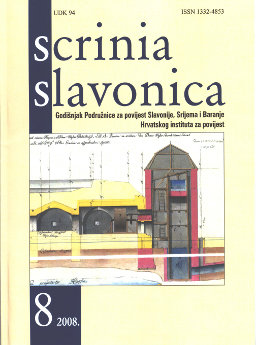Sjedinjene Američke Države i reintegracija hrvatskog Podunavlja
The United States of America and the reintegration of the Croatian Danube Region
Author(s): Albert BingSubject(s): History
Published by: Hrvatski institut za povijest
Keywords: Croatian Danube region; USA; American foreign policy; Erdut peace agreement; peaceful reintegration.
Summary/Abstract: This paper provides a review of the activities of the American diplomacy in the implementation of the Erdut Peace Agreement in the broader context of post-Dayton Croatian-American relations. It focuses on the mandate of the so-called Interim Administration (1996-1998) and offers a broader review of the reintegration process after this period as well. The paper is based primarily on published documents of American provenance, which offer a glimpse into the objectives and methods used by American diplomacy and the problems of bilateral relations between the countries, i.e. the positioning of Croatia in the international community. Within the analysis of Croatian-American relations – with regard to the Croatian Danube Region – special emphasis has been laid on the analysis of American positions. The promotion and reaffirmation of multiculturalism in contrast to ethnic homogenization (as the basic feature of the conflicts in “Yugoslav wars” during the nineties) is thus considered not only as American contribution to the stabilization of the region, but also as a component of the process of maturation of American foreign affairs doctrine until the present day. Even though the presence of the United States in the territory of former Yugoslavia and the broader region had undergone considerable metamorphoses – ranging from general detachment from the “Balkan” problems in 1991 to the military intervention in the Socialist Republic of Yugoslavia in 1999 – in spite of numerous controversies, it clearly displayed the tendency of “coming out” of the crisis of American post-cold war lack of purpose. American diplomatic initiative played an important role in this process – taking over the international leadership in the control of (post)Yugoslav wars in 1994-1995, which resulted in three relatively successful peace agreements that put an end to the wars in Croatia and Bosnia and Herzegovina: the Washington Agreement (1994), the Erdut Agreement (1995) and the Dayton Agreement (1995). The Erdut Peace Agreement had a special significance for Croatia, for which the achievement of full sovereignty and territorial integrity was the most important issue after its international recognition in January 1992. For the United States, the Erdut concept of peaceful reintegration was the only political project that, at least to a certain extent, created a balance between the sovereignty of a national government on one hand, and the building of the ideals of democratization and civil society (nation building) advocated by the Americans on the other.
Journal: Scrinia Slavonica
- Issue Year: 2008
- Issue No: 8
- Page Range: 336-365
- Page Count: 31
- Language: Croatian

